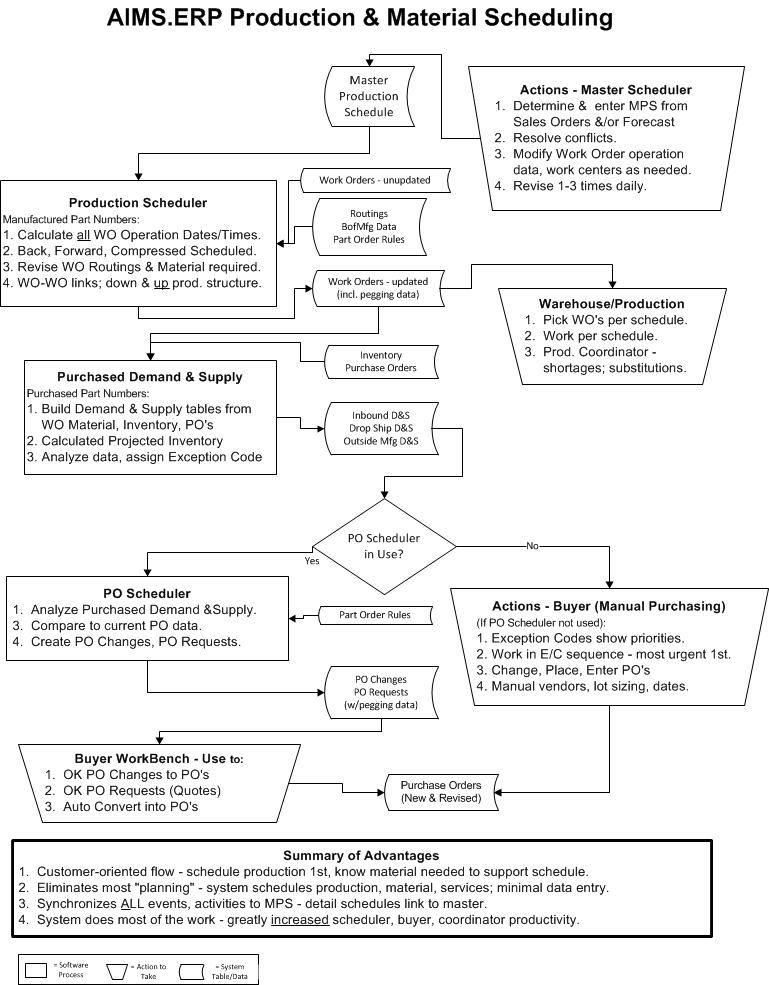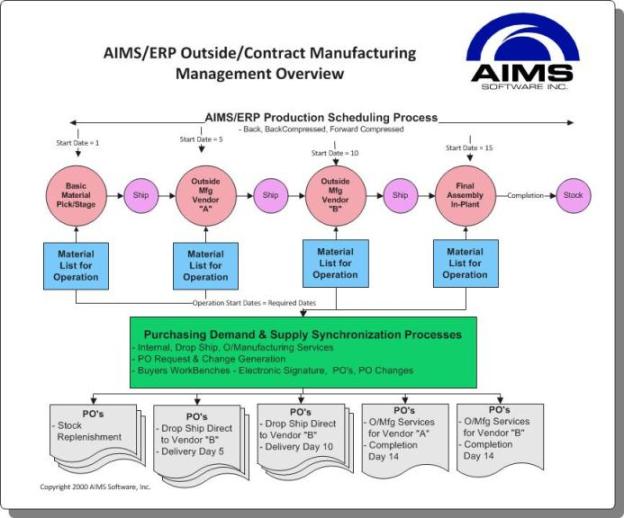 |
  Primary Product: |
|
Scheduling - Production & Activities This is the most powerful module in the AIMS/ERP system. It uses the Bill of Manufacture data structure coupled with Work Order data structures that are fully populated, and that can be individually modified or created from scratch even while in a "planned' status, with only the dates being changed. This method supports project-oriented, engineer to order, build-to order, assemble-to-order (from configured-to-order sales orders),one-off, repetitive and periodic production all concurrently. Routing steps can be internal or vendor-performed, allowing a complex mix of work and material flows. Scheduling in AIMS/ERP is driven completely from the Master Production Schedule function - which defines and controls all independent demand. The process backschedules from these dates, uses a compression algorithm to attempt to fit potentially late work steps into the schedule (there are no "past due" dates in AIMS/ERP), and if this fails, will forward schedule UP the product structure, pushing out the projected completion dates, all while retaining the originally scheduled dates so they can be compared. Projected Days Late - this function / report identifies scheduled production that, if not changed, will result in a later completion date than originally scheduled in the MPS. No MRP systen can produce this kind of data. For purchased material, since material is attached to specific steps in the routing - on or off-site - AIM/ERP produces several distince and separated demand/supply review processes, described in more detail in the Purchasing section of this site. All purchased material includes what is needed, the quantity required, the date needed, and WHERE it is requiried. These data streams drive Buyer Workbenchs that provide a very efficient, highly automated way of originating purchase orders, and another for reviewing and generating PO Changes that result from Scheduler updates.
Prioritized Buyer Actions - in each of these data streams/displays each part number's demand/supply status is analyzed and assigned an Exception Code, depending on how urgent buyer action is, or is not. In the WorkBench the buyer's default (other options are available) work sequence is to work on the most urgent part numbers first. Manufactured Part Demand & Supply - there is a separate demand/supply stream display but it needs little or no review because of the fact that ALL work orders - planned and in process - are scheduled in the same way, keeping demand & supply under control. A White Paper, "Synchronized Production & Material - Beyond MRP" - explains how the advanced synchronized scheduling of production & material is different from the 40 year old MRP model and its inherent disadvantages. The PDF of this paper can be downloaded at THIS link. Below are two diagrams that illustrate how the AIMS/ERP synchronized production & material process works, including an example of a complex inside/outside production & material flow works. Some of the extensive documentation for how the scheduling process functions can be downloaded at document links below. AIMS/ERP Production & Material Scheduling Steps - are summarized in the diagram below:
Outside/Contract Manufacturing - AIMS/ERP was built specifically to support a complex off-site flow of material through any number of combinations of procurement, direct shipment, vendor-to-vendor shipments of intermediate products or subassemblies. The diagram below summarizes how this flow functions.
- AIMS/ERP Scheduler - Documents - Scheduler Specifications - this is the detailed software design specification for the core scheduling process - PDF at THIS Link. Training - Using the Scheduler Guide - - PDF at THIS link. |

